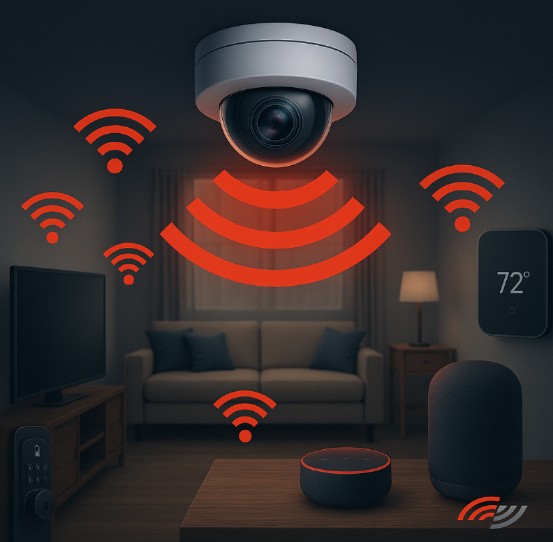
The convenience of smart homes has transformed the short-term rental industry. Guests can enjoy keyless entry, voice-controlled lights, smart TVs, and climate-controlled comfort—all with a touch or a voice command. But beneath the surface of this tech-powered hospitality lies a growing concern: privacy.
From hidden cameras to network tracking, the very devices designed to enhance your stay may also be watching, listening, or logging your behavior—sometimes without your consent. If you’re booking an Airbnb or any short-term rental, it’s essential to understand how smart devices can be misused and what you can do to protect yourself.
???? 1. Hidden Cameras: The Silent Watchers
Airbnb has policies in place that require hosts to disclose any security cameras on the property and prohibit them in private areas like bedrooms and bathrooms. However, there have been multiple real-life incidents of guests discovering undisclosed or hidden cameras in alarm clocks, smoke detectors, motion sensors, or even air purifiers.
???? Why it’s alarming:
-
Cameras can stream or store footage without your knowledge.
-
Some are camouflaged so well they are virtually undetectable.
-
Discovery often happens accidentally, when it’s too late.
Tip: Shine a flashlight around the room to detect reflective lenses. Apps like Hidden Camera Detector or Fing can scan for unknown devices.
????️ 2. Voice Assistants That Could Be Listening
Devices like Amazon Echo, Google Home, and Apple HomePod are common in rentals. These voice assistants are supposed to listen only when triggered by a wake word—but that’s not always the case. Some models record snippets of conversations, store them on the cloud, and in some cases, hosts can access that data.
???? The risks:
-
Accidental activation may result in sensitive conversations being recorded.
-
Stored recordings could include personal or financial info.
-
You may not be aware these devices are even in the room.
Tip: Check for and disable voice assistants or unplug them if you’re concerned. Always ask hosts if such devices are present before booking.
???? 3. Smart Locks That Track Your Movement
Smart locks offer convenience—but they also log every entry and exit, creating a timestamped log of your movements. While that data can help hosts manage check-ins, it could also be used to monitor guest activity—like when you leave for the day or how often you come and go.
???? What’s the issue?
-
Potential for surveillance-based profiling
-
Combined with other data, can build a behavioral pattern
-
Raises questions about data storage and sharing
Tip: Ask how smart locks are used and if movement data is stored or monitored.
????️ 4. Smart Thermostats and Motion Sensors
Smart thermostats like Nest or Ecobee may include motion or occupancy sensors that detect when you’re present. Some even adjust based on your movement or send alerts to hosts if movement is detected when the property is supposed to be vacant.
⚠️ Why it matters:
-
These sensors can indirectly track your presence in rooms.
-
Combined with camera or lock data, they may reveal your entire schedule.
-
You’re rarely informed about how this data is being collected or used.
???? 5. Network Snooping via Wi-Fi
When you connect to a rental’s Wi-Fi, you’re entering a network that could potentially be monitored by the host. While uncommon, a technically inclined or malicious host could use packet sniffers or other tools to log your browsing activity, see what devices you’ve connected, or even intercept unencrypted data.
????️ How your data could be at risk:
-
Viewing or logging sites visited, apps used, or streaming activity
-
Accessing personal or work-related credentials
-
Using your connection to inject ads or malware
Tip: Always use a VPN when using public or rental Wi-Fi to encrypt your activity and protect sensitive data.
???? How to Protect Your Privacy When Staying in an Airbnb
Here are practical steps you can take to maintain your privacy:
✅ Before Booking
-
Ask direct questions about smart devices and surveillance policies.
-
Read reviews carefully for red flags related to privacy issues.
-
Look for Superhosts or properties with a long history of positive stays.
✅ Upon Arrival
-
Physically inspect for hidden devices—especially in private areas.
-
Use apps like Fing to detect connected smart home devices or hidden cameras.
-
Unplug or cover devices like voice assistants, cameras, or smart displays if you’re uneasy.
✅ During Your Stay
-
Use a VPN when accessing the internet.
-
Avoid logging into sensitive accounts over unsecured networks.
-
Keep valuables and personal conversations away from smart devices.
???? What to Do If You Find a Suspicious Device
If you believe you’ve found an undisclosed camera or device:
-
Document it (take photos or videos).
-
Leave the property if you feel unsafe.
-
Contact Airbnb support immediately.
-
File a police report if you believe local laws were violated.
Airbnb takes violations seriously and may remove hosts or even provide refunds for privacy breaches.
???? Final Thoughts
As technology becomes more embedded in the spaces we rent, guests need to become more proactive in protecting their digital and physical privacy. While most hosts use smart devices responsibly, a few bad actors have turned them into tools of surveillance. Don’t assume privacy—verify it.
Whether you’re traveling for work, a weekend getaway, or a long-term stay, staying informed and vigilant can help ensure your smart rental doesn’t turn into a privacy nightmare.
